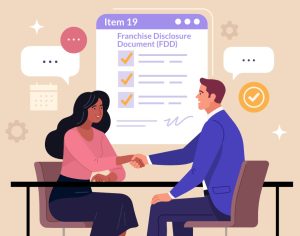Originally it may have been considered as a system to manage the sales process with prospects, etc. but it has evolved from that to a system for a business to manage all its processes. In a franchise environment this is managing prospects, franchisees, suppliers, clients and putting a system in place for any business process. They can also store key information, such as communications and documents – the franchise manual and agreements in our context.
What are the benefits of using a CRM system?
Well, on the one hand it allows the business to compile data from a range of sources and produce reports on how the business is doing in certain areas, such as conversion rates, financials, etc. – the KPIs a business wants to measure. It also saves time from a myriad of spreadsheets and other documents that might be used in a business to collect information. Furthermore, it provides a place for information to be stored and retrieved when needed. Perhaps more importantly it puts the business processes on a system that makes things happen automatically or for franchisees and their staff to follow. To bring that to life consider a franchise discovery day where attendees are added, automatically as part of the recruitment process. All attendees will then be sent joining instructions and reminders ahead of the event taking place and provided they attend automatic follow up emails. In a business process example once a franchisee or their staff visit a client and updates their job on the system to complete it will automatically compile an invoice and send it to the client or in the case of a national account is added to the jobs completed for the daily/weekly/monthly invoice. Of course the ultimate aim of any system is to convert and retain customers (or franchisees) and boost sales growth.
What type of systems are there and what costs will there be?
Systems can be off the shelf or bespoke, depending on the degree of flexibility the end user/franchisor requires. Some off the shelf systems are perfectly acceptable for a small business but for a franchisor, which constantly needs to adapt their business to keep abreast of current trends, etc., a bespoke system is often the best solution. There are 2 options then for a franchise business, one being to develop their own system, which can run to £multi-million overall costs or use one of the few franchise specialist CRM providers for this, at a fraction of the cost. Azura are just one of those systems where there is a set up cost of up to £5,000 and a monthly fee dependent on the complexity of the business of up to £85 per franchisee per month. Other systems may have a cost per user, which would include all head office staff, franchisees and their staff with access to the system. Some systems that take credit/debit card payments may also charge for the service. Unlike an off the shelf system a bespoke one allows it to be adapted to the franchisor’s specific requirements, as no two systems are the same, even if it appears they offer the same service. These adaptations should be included in the monthly cost. If you run a fairly simple franchise model the costs are at the lower end but if you run a large network and have national accounts you are likely to need regular updates, then it will be the higher figure.
How can a franchise system access their CRM system?
The system should be able to be accessed from a range of technology – desk tops and the full range of mobile devices. They will typically be cloud-based and accessible whether there is Wi-Fi, a network signal or no signal. In the case of the latter the system should be updated when Wi-Fi or the network does become available. Any customer interaction should feed through to the system, whether they visit your website, send an email, read, comment or react on social media or call.
How can the costs be included in the franchise package to franchisees?
In my opinion the set-up cost itself should be paid for by the franchisor, as it is of benefit for the entire network, including company operations. There are then 3 options for the monthly costs:
- Franchisor pays the costs,
- a sharing of the costs, perhaps dependent on how many company versus franchisee operations there are. If the system costs are per user this is the fairest way to allocate the expense
- pass on the cost to the franchisee.
Whichever option is determined this can be included in the information provided to new franchisees, so that they can account for the costs in their business plans, if appropriate.







